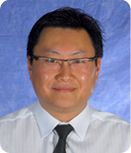个人简介
B.Sc.(Hons), Imperial College of Science, Technology and Medicine, 1992-1995; Ph.D., Ecole Polytechnique Federale de Lausanne, 2003-2007; NUS Overseas Postdoctoral Fellow, Massachusetts Institute of Technology, 2007-2009
研究领域
Inorganic/Organometallic & Medicinal Chemistry
Our research interest lies at the interface of chemistry and biology, in the study and development of metallopharmaceuticals for cancer therapy. Current platinum(II) anticancer drugs, including cisplatin and carboplatin, are some of the most effective anticancer drugs in clinical use but their applications are limited their toxic nature and incidence of drug resistance. Alternative chemotherapeutic strategies that we are currently exploring include:
a. Functionalized platinum(IV) anticancer compounds. Bis-ammine platinum(IV) compounds belong to an novel class of platinum compounds that can be designed as a pro-drug to cisplatin or other platinum(II) anticancer compounds. They are interesting because they are typically stable at ambient conditions but can be reduced by intracellular biomolecules to release the cytotoxic payload. This strategy has been utilized in the development of satraplatin which is undergoing clinical evaluation as an anticancer drug. We are interested in exploiting this strategy to develop platinum drugs that could overcome drug resistance mechanisms.
b. Ruthenium-based anticancer compounds. Ruthenium has emerged as an attractive alternative to platinum with two ruthenium-based drug candidates undergoing clinical evaluation. Ruthenium drugs are known to be well-tolerated in vivo and have demonstrated high selectivity towards cancer cells in comparison to healthy cells in vitro. We are interested in extending this area of research to develop highly effective ruthenium drugs with low systemic toxicity.
We are also interested in developing techniques to study the interactions of these transition metal-based anticancer drugs with their biological targets. It is often difficult to identify the target of a particular drug, even ones that have been demonstrated to be highly effective against cancer cells, due in part due to the complexity of the cellular environment. Building on established genomics and proteomics methodologies, we are working to develop new tools that can be applied not only in the identification of drug targets, but also in the investigation of metal drug-target interactions.
近期论文
 查看导师最新文章
(温馨提示:请注意重名现象,建议点开原文通过作者单位确认)
查看导师最新文章
(温馨提示:请注意重名现象,建议点开原文通过作者单位确认)
D. Y. Q. Wong, C. H. F. Yeo, and W. H. Ang*, Immuno-Chemotherapeutic Platinum(IV) Prodrugs of Cisplatin as Multimodal Anticancer Agents, Angew. Chem. Int. Ed., 2014, 26, 6752-6756
J. Li, A. Pant, C. F. Chin, W. H. Ang*, C. Ménard-Moyon, T. R. Nayak, D. Gibson, S. Ramaprabhu, T. Panczyk, A. Bianco*, G. Pastorin*, In vivo biodistribution of platinum-based drugs encapsulated into multi-walled carbon nanotubes, Nanomedicine: Nanotechnology, Biology and Medicine, 2014, in press
C. F. Chin,S. Q. Yap, J. Li, G. Pastorin*, and W. H. Ang* , Ratiometric Delivery of Cisplatin and Doxorubicin using Tumour-Targeting Carbon-Nanotubes Entrapping Platinum(IV) Prodrugs , Chem. Sci, 2014, 5, 2265-2270
S. L. Yoong, B. S. Wong, Q. L. Zhou, C. F. Chin, J. Li, T. Venkatesan, H. K. Ho, V. Yu, W. H. Ang*, and G. Pastorin*, Enhanced cytotoxicity to cancer cells by mitochondria-targeting MWCNTs containing platinum(IV) prodrug of cisplatin, Biomaterials, 2014, 35, 748-753
D. Montagner, S. Q. Yap, and W. H. Ang*, A Fluorescent Probe for Investigating the Activation of Anticancer Platinum(IV) Prodrugs Based on the Cisplatin Scaffold, Angew. Chem. Int. Ed., 2013, 52, 11785-11789
P. Paira, M. J. Chow, G. Venkatesan, V. K. Kosaraju, S. L. Cheong, K.-N. Klotz, W. H. Ang*, G. Pastorin*, Organoruthenium Antagonists of Human A3 Adenosine Receptors, Chem. Eur. J., 2013, 19, 8321-8330
C. F. Chin, Q. Tian, M. I. Setyawati, W. Fang, E. S. Q. Tan, D. T. Leong, W. H. Ang*, Tuning the activity of platinum(IV) anticancer complexes through asymmetric acylation, J. Med. Chem., 2012, 55, 7571-7582
J. Li, S. Q. Yap, C. F. Chin, G. Pastorin*, W. H. Ang*, Platinum(IV) prodrugs entrapped within multiwalled carbon nanotubes: Selective release by chemical reduction and hydrophobicity reversal, Chem. Sci., 2012, 3, 2083-2087
D. Y. Q. Wong, J. Y. Lau, W. H. Ang*, Harnessing chemoselective imine ligation for tethering bioactive molecules to platinum(IV) prodrugs, Dalton Trans., 2012, 41, 6104-6111
J. X. Ong, C. W. Yap, W. H. Ang*, Rational Design of Selective Organoruthenium Inhibitors of Protein Tyrosine Phosphatase 1B, Inorg. Chem., 2012, 51, 12483-12492
Q. Tian, W. Wong, Y. Xu, Y. Chan, H. K. Ho, G. Pastorin, W. H. Ang*, Immobilisation of quantum dots by bio-orthogonal PCR amplification and labelling for direct gene detection and quantitation, Chem. Commun., 2012, 48, 5467-5469




 京公网安备 11010802027423号
京公网安备 11010802027423号